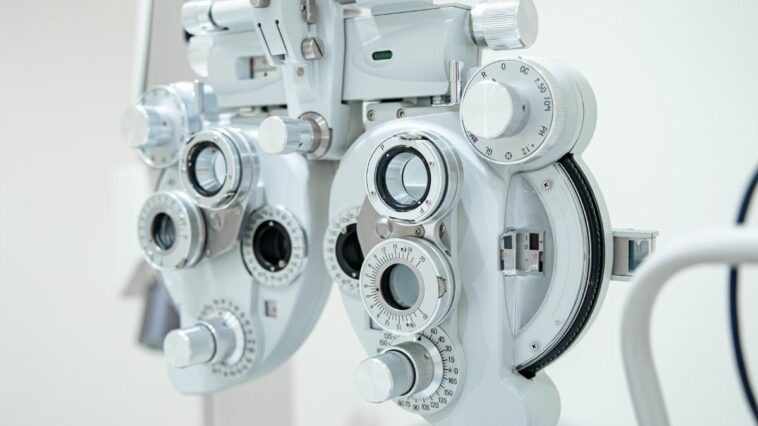A LASIK eye center is a medical facility specializing in LASIK surgery, a type of refractive surgery that corrects common vision problems such as nearsightedness, farsightedness, and astigmatism. LASIK eye centers employ specialized eye doctors and surgeons with extensive training and experience performing LASIK surgeries.
LASIK eye centers typically use advanced technology to perform LASIK procedures, such as femtosecond lasers and excimer lasers. The center will typically perform a comprehensive eye exam to determine if a patient is a good candidate for LASIK surgery. If a patient is deemed eligible, the surgeon will use advanced technology to create a flap in the cornea and reshape the corneal tissue to correct the refractive error.
In addition to performing LASIK surgeries, LASIK eye centers may offer other types of vision correction procedures, such as PRK (photorefractive keratectomy) and LASEK (laser epithelial keratomileusis).
When choosing a LASIK eye center, it’s essential to consider factors such as the surgeon’s experience and expertise, the technology used, and the center’s track record for successful outcomes and patient satisfaction.
Research the Surgeon’s Experience and Expertise
If you are considering LASIK eye surgery, it is vital to research the surgeon’s experience and expertise before deciding. Here are some steps you can take to evaluate a LASIK surgeon:
- Check the surgeon’s credentials: Ensure that the surgeon is board-certified in ophthalmology and has completed additional training and certification in LASIK surgery. You can find this information on the surgeon’s website or by contacting the American Board of Ophthalmology.
- Review the surgeon’s experience: Find out how many LASIK surgeries the surgeon has performed and how long they have been performing the procedure. A surgeon with extensive experience is likelier to have encountered a wide range of situations and complications and can draw on this experience to deliver better results.
- Look for patient reviews: Search online for reviews from previous LASIK patients. This can give you an idea of the surgeon’s bedside manner and the quality of their surgical results.
- Ask for references: Request references from the surgeon and contact these patients directly to discuss their experience with the surgeon and the procedure.
- Inquire about the equipment and technology: LASIK technology is constantly evolving, and ensuring that the surgeon uses the latest and most advanced equipment is crucial.
- Schedule a consultation: Finally, meet with the surgeon for a consultation to discuss your candidacy for LASIK and ask any questions you may have. This is an opportunity to evaluate the surgeon’s communication skills and determine whether you feel comfortable with them as your surgeon.
By following these steps, you can better understand the surgeon’s experience and expertise and make an informed decision about LASIK eye surgery.
Understand Your Vision Insurance Coverage.
Understanding your vision insurance coverage is vital to help you get the eye care and corrective lenses you need while minimizing out-of-pocket costs. Here are some steps you can take to understand your vision insurance coverage better:
- Review your policy documents: Start by reviewing your policy documents to understand what is covered and what is not. Pay attention to the benefits, such as the frequency of coverage, allowed lenses or frames, and any exclusions or limitations.
- Check your network: Determine which eye care providers are in your insurance plan’s network. If you go out of network, your out-of-pocket costs may be higher, or some services may not be covered.
- Know your benefits: Be familiar with the benefits offered by your vision insurance, such as routine eye exams, contact lenses, glasses, and other corrective lenses. Knowing your benefits will help you use your coverage more effectively and avoid unexpected costs.
- Understand your costs: Familiarize yourself with your deductible, copayments, and other out-of-pocket costs. Knowing what you are expected to pay will help you budget and plan for your vision care expenses.
- Ask questions: If you have any questions about your vision insurance coverage or benefits, don’t hesitate to ask your insurance or eye care provider. They can help clarify any issues and ensure you get the necessary care.
By taking these steps, you can better understand your vision insurance coverage and make more informed decisions about your eye care needs. This can help you save money and get the care you need to maintain good eye health and vision.
How To Choose a Reliable Lasik Eye Center?
Choosing the right LASIK eye center is an important decision that can affect your surgery’s outcome and overall eye health. Here are some steps you can take to choose a LASIK eye center:
- Research the center: Research online and read reviews from previous patients. Check if the center is accredited and the surgeons are board-certified and experienced.
- Evaluate the surgeon: Check the surgeon’s experience, expertise, and success rates. Choosing a surgeon with a good track record of successful surgeries and positive patient experiences is essential.
- Technology and Equipment: Check if the center is using the latest technology and equipment in the field of LASIK. The latest technology and equipment can help increase the precision and accuracy of the procedure, resulting in better visual outcomes and faster recovery times.
- Consultation: Schedule a consultation with the center’s surgeon. This consultation can help you assess the surgeon’s communication skills, bedside manner, and level of knowledge and expertise. During this consultation, ask questions about their experience, the technology they use, the risks involved, and the expected outcomes.
- Cost: LASIK surgery can be expensive, so it’s essential to know the cost upfront and check if the center offers financing options or insurance coverage. However, price should not be the only factor in your decision, as the cheapest option may not always be the best.
- Aftercare: Ensure that the center offers post-operative care and follow-up visits. A good LASIK center will offer comprehensive aftercare services to ensure that your eyes heal properly and that any complications are addressed.
By taking these steps, you can make an informed decision about the LASIK eye center that best suits your needs and expectations. Choosing the right center can help ensure you have a successful surgery and achieve optimal results.
Necessary Infrastructure In a LASIK Eye Center
A LASIK eye center requires specific infrastructure to provide high-quality care to patients undergoing LASIK surgery. Here are some of the necessary infrastructure elements that a LASIK eye center should have:
- Clean and sterile environment: A LASIK eye center must maintain a clean and sterile environment to prevent the risk of infections during the surgery. The center should have dedicated operating rooms with specialized equipment to ensure the highest level of sterility.
- Advanced technology: The LASIK eye center should have the latest technology and equipment to perform LASIK surgeries with precision and accuracy. Advanced diagnostic equipment and laser technology can help detect and correct various eye conditions.
- Experienced and qualified staff: The center should have a team of highly skilled and experienced surgeons, nurses, and support staff to ensure that patients receive personalized care and attention throughout the surgery and post-operative care.
- Comfortable patient rooms: The LASIK eye center should be comfortable and relaxing. The patient rooms should have comfortable chairs or beds, blankets, and pillows to ensure the patient feels at ease during the procedure.
- Post-operative care: The LASIK eye center should provide comprehensive post-operative care to ensure patients recover fully and without complications. This may include follow-up appointments, medication, and other support services.
- Emergency services: The center should be equipped to handle any medical emergencies that may arise during surgery or post-operative. This may include emergency medication, oxygen, and defibrillators, and the staff should be trained in essential life support.
By having the necessary infrastructure elements in place, a LASIK eye center can provide the best care to its patients, resulting in successful LASIK surgery outcomes and happy patients.
Ask About Complication Rates and Success Rates of Surgery
Asking about complications and success rates of LASIK surgery is essential in making an informed decision about your eye care. Here are some things to consider:
- Complication rates: LASIK surgery is generally considered a safe procedure, but like any surgery, it does carry some risks. Complications can include dry eyes, halos or glare, overcorrection or under-correction, and other vision problems. When considering a LASIK eye center, it’s essential to ask about their complication rates and how they handle any possible complications. A reputable center will be transparent about its rates and have protocols to manage complications.
- Success rates: Success rates refer to the percentage of patients who achieve their desired visual outcome after LASIK surgery. Success rates can vary depending on the center, the surgeon, the patient’s eye health, and other factors. When researching LASIK eye centers, ask about their success rates and how they measure them. A reputable center should be able to provide you with data on their success rates and any factors that may affect them.
- Factors that affect outcomes: It’s also important to understand that many factors can affect the success of LASIK surgery, including the patient’s age, eye health, and the severity of their refractive error. It’s crucial to thoroughly consult the surgeon to discuss your case and any potential risks or challenges.
By asking about complications and success rates, you can make an informed decision about the right LASIK eye center and surgeon. Choosing a center with a strong track record of success and transparency about its rates and outcomes is essential.
Look for Advanced Laser Technology at the Lasik Eye Center Facility
Looking for advanced laser technology at a LASIK eye center facility is essential when choosing a center for your LASIK surgery. Here are some reasons why:
- Improved accuracy: Advanced laser technology can improve the accuracy of LASIK surgery, leading to better visual outcomes for the patient. The latest technology can help the surgeon precisely map and correct the patient’s refractive errors, resulting in more accurate vision correction.
- Faster recovery: Advanced laser technology can lead to a faster recovery time for the patient. Advanced lasers can perform the LASIK procedure with greater speed and precision, minimizing the trauma to the eye and reducing the risk of complications.
- Customization: Advanced laser technology can be customized to patients’ unique eye characteristics. This can lead to a more personalized approach to LASIK surgery, ensuring the patient’s needs and visual goals are considered.
- Safety: Advanced laser technology can improve the safety of the LASIK procedure. The latest technology can perform the procedure with greater precision, reducing the risk of complications and minimizing the chance of damage to the surrounding tissues.
- Reduced discomfort: Advanced laser technology can also reduce the discomfort associated with LASIK surgery. The latest lasers are designed to be less invasive and cause less trauma to the eye, resulting in less post-operative discomfort for the patient.
When choosing a LASIK eye center, looking for a center that uses the latest laser technology is essential. Be sure to ask about the type of laser technology used at the center, the surgeon’s experience using the technology, and the outcomes achieved by previous patients. This can help ensure you receive the highest quality of care and the best possible visual outcomes.
Conclusion
Choosing the right LASIK eye center is essential for anyone considering LASIK surgery. Factors to consider include:
- The surgeon’s experience and expertise
- The technology used at the center
- The center’s policies for aftercare and follow-up appointments
- The cost of the procedure
Additionally, patients should ask about the center’s success rates and complication rates, as well as any potential risks or challenges that may affect the outcome of the surgery.
By researching and asking the right questions, patients can find a LASIK eye center that will provide them with the best possible care and the highest chances of achieving successful visual outcomes. With the help of a qualified and experienced LASIK surgeon, patients can experience the benefits of clearer vision and improved quality of life without the need for glasses or contact lenses.






